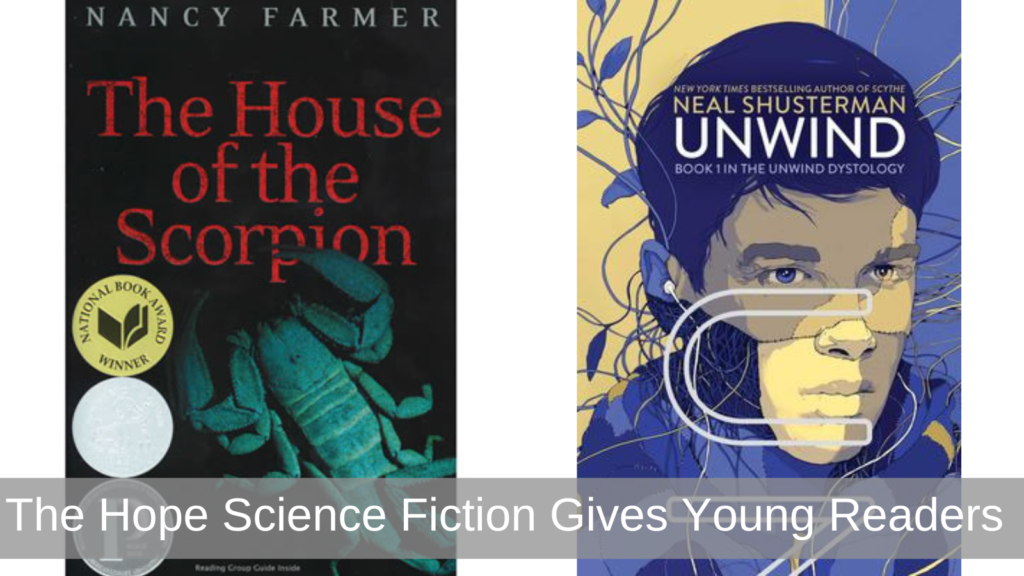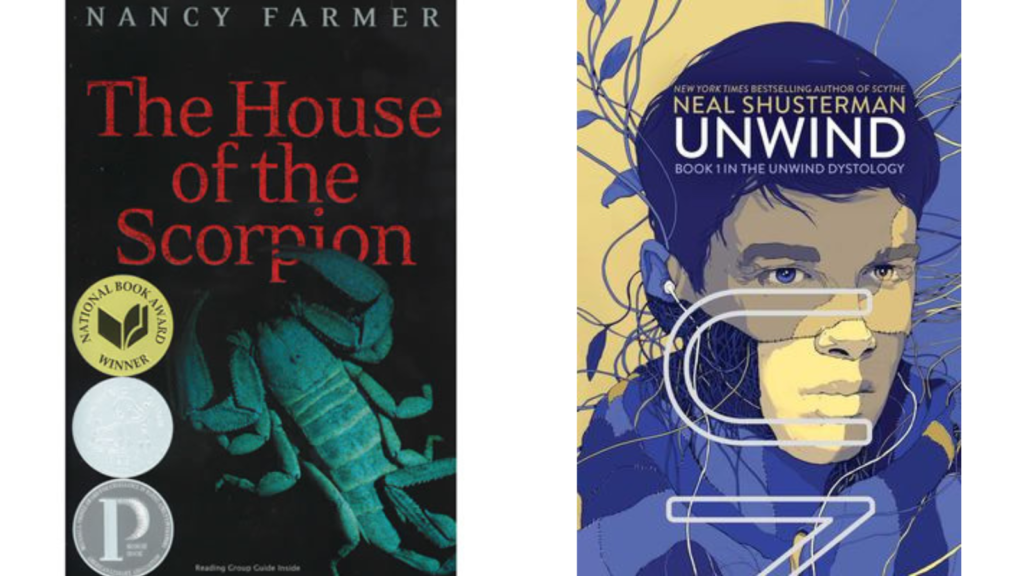by Lexi Cooper, editor
How is it possible that science fiction helps young readers? The messages in these novels teaches young readers invaluable lessons. In the societies of the dystopian genre, which continues to be quite popular in young adult fiction, more value is often placed on other things than the individual’s own worth. Because of advances in technology in the futuristic setting, this genre can explore what it means to be human and what the value of a life is in different ways than books set in our time, the past, or even fantasy worlds can. Those are just some reasons how science fiction helps young readers.
What Does It Mean To Be Human?
The House of the Scorpion by Nancy Farmer and Unwind by Neal Shusterman delve into the above questions in really interesting ways.
Insights from Unwind by Neal Shusterman
Unwind takes place in a fictional future after the Second Civil War between the Pro-life and Pro-choice armies. The Bill of Life, the solution to end the war, states that human life may not be touched from the moment of conception until a child reaches the age of thirteen. But between the ages of thirteen and eighteen, a parent may choose to retroactively “abort” a child on the condition that the child’s life doesn’t “technically” end. The process by which a child is both terminated and yet kept alive is called “unwinding.”
To keep those who are unwound “alive” every part of their body must be recycled into the body of someone else. With the introduction of unwinding into the world, many things changed. It was suddenly easier to just replace broken body parts than to try to fix them. Thus, medical advancements were no longer important, but a constant supply of body parts was. This caused acquiring these biological parts to become one of the society’s main focuses.
This sparked many reasons for a teenager to be unwound, and the three main characters each represent one of these reasons. Check out Neal Shusterman’s other novels in this series.
Conner

Connor wasn’t a terrible kid, but he didn’t get the best grades and got into some fights. Essentially, Connor’s parents decided to have him unwound because they didn’t want to deal with a difficult kid like him. Through Connor we see that this society believes that your life is only worth something if you are a “good kid.” If not, your body parts are more valuable than your whole.
Lev
Another main character, Lev, is a tithe, which means his parents chose him to be unwound as a religious offering. His “sacrifice” is seen as a service to God and mankind. Instead of living a life of actual service to God and mankind, a tithe’s “service” becomes the donation of their biological parts, placing those parts as more valuable than a life of doing good to others. Human tithing is justified as part of their religion, assigning the donation of these biological parts as the pinnacle of one’s devotion to one’s god. This implies that those who don’t tithe their children or those who look down on tithing are unrighteous and lack faith.
Risa

Our final main character in Unwind, Risa, grew up in a State Home, where many unwanted children end up. These homes can only support so many kids and are “forced” to unwind a percentage of their teenagers. They determine which kids to cut by how well they perform in their chosen fields. After a piano performance that wasn’t up to their ridiculous standards, the State Home officials tell Risa that she has reached her potential and gone as far as she can go. Risa is being unwound because she isn’t talented or skilled enough. She made five mistakes in her performance, five mistakes that cost Risa her life. This society has gone so far that something as simple as a piano recital determines whether someone is worth keeping alive. While Risa is a talented musician, her skills are not worth enough to keep her living.
Insights from The House of the Scorpion by Nancy Farmer

Farmer’s novel The House of the Scorpion also takes place in a futuristic setting that has changed society’s views. In the world Farmer created, eejits and clones are common. An eejit is a person or animal with an implant in its head. They can do only simple things, and they can’t do anything without a command. This demonstrates this society’s emphasis on bodies performing work and their devaluation of individual intelligence and freedom.
Like eejits, clones are created for the purpose of using their bodies to benefit someone else. Clones are utilized to prolong the life of the person they were cloned from by means of continual implants from clones. Usually clones have their intelligence taken away from them. They are more like a shell of a person, only as valuable as their parts. Thus, they are treated like cattle, raised, in the case of our main character Matt, to be slaughtered. Clones and eejits are perfect examples of how this society supports taking away the intelligence of someone and using their body however they see fit.
Science Fiction Can Teach Young Readers
As you can see, because of the technology in these worlds, the standards for what makes a life worth living and protecting has shifted. This opens up the door for really interesting discussions, but the novels both also come to their own conclusions. In Unwind, each of the main characters come to realize that the people who decided that they should be unwound were wrong. From The House of the Scorpion that clones and eejits are real human beings who deserve their intelligence and free will.
Each character finds the inherent value within themselves and within every human being. They discover what it means to be human and what the value of a life is. Often with the help of a mentor character, they realize that the way most people think in their society is wrong. Society tells them that they must be a good kid or talented to keep living. Or that they were raised for the donation of their biological parts and that’s just how it is. What a brilliant idea for young readers to learn through these and other science fiction novels. Science fiction helps young readers and old. These novels give a message about a young reader’s own worth. No matter what society tells them, their life is worth living, and they have innate value.

Interested in more Science Fiction novels? Check out BDR Publishing’s reading recommendations.

